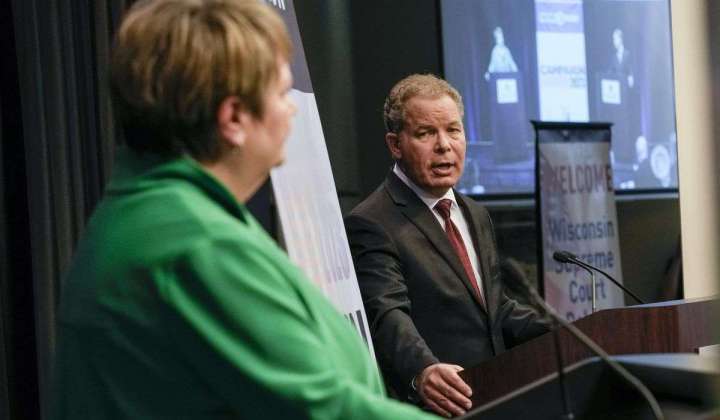Rule of law on the ballot in Wisconsin Supreme Court justice runoff election

OPINION:
The most interesting and perhaps most important single political campaign this year is occurring right now over the seventh and decisive seat on the Wisconsin Supreme Court.
The two contestants are Republican Dan Kelly, a former Wisconsin Supreme Court justice, and Democrat Janet Protasiewicz, a Circuit Court judge, the two top finishers in February’s jungle primary. The runoff between the two is on April 4. The winner’s political party will control a narrow 4-3 majority on the state’s highest court.
For the Republicans, the stakes are clear. A win by Judge Protasiewicz would almost certainly lead to an effort to redraw the state and congressional legislative districts (Republicans have comfortable margins in both the state Assembly and the state Senate).
A Wisconsin Supreme Court with Judge Protasiewicz would also almost certainly lead to greater tolerance of criminality, an important consideration in a state that in recent years has been rocked by riots in Kenosha and a racially motivated mass killing in Waukesha.
It has not been lost on voters that Judge Protasiewicz, in a ruling from the bench, gave no jail time to a woman who essentially starved her 15-year-old disabled child to death. Nor is it lost on voters that Judge Protasiewicz’s endorsements include a group that has sought to defund the police.
As for the Democrats, they have made this election entirely about abortion. When Roe v. Wade was overturned last June, Wisconsin law reverted to an 1849 law that outlaws abortion with no exception for saving the life of the mother. Both parties are dug in on this issue, and a legislative solution does not appear on the horizon.
Judge Protasiewicz has indicated that she will find a right to abortion in the state constitution if such a case arrived at the court. Justice Kelly has insisted, correctly, that a judge takes cases as they come and has refused to take a position.
It will come as no surprise that the national Democrats have become involved. Emily’s List — a national pro-abortion group — bragged in a recent mailer that it specifically broke with tradition to endorse Judge Protasiewicz because she is a “long-time community leader and proven pro-choice champion.”
It should also come as no surprise that folks on the right have gotten involved as well. The Judicial Fairness Initiative, which is a project of the Republican State Leadership Committee, recently ran ads in Wisconsin. The initiative’s president, Dee Duncan, said in a written statement: “The last thing the people of Wisconsin need is liberal outsiders telling them how to live their lives, at a time where the Badger State needs strong representation on the state supreme court to uphold the rule of law.”
One of the accelerants to this particular contest is that the election is for a 10-year term, so it has a certain fin-de-siecle overtone.
In the primary, Judge Protasiewicz received the most votes, almost 225,000 more than Justice Kelly. When the votes of all the primary candidates are combined, candidates on the left received about 75,000 more votes than those on the right. Simply aggregating votes in a jungle primary is not necessarily a sturdy methodology, as a candidate’s popularity is not always transferable.
That said, Justice Kelly has lost a Supreme Court runoff before. In 2020, he received 352,000 votes, which is about 150,000 fewer votes than he will need to win on April 4.
At the same time, Wisconsin has been trending, if haltingly, Republican over the last few election cycles. In 2008, President Barack Obama won the state by 400,000 votes. Eight years later, President Donald Trump won Wisconsin by about 23,000 votes.
More than $30 million has already been spent on the campaign, and the final number is likely to be much higher. The Democrats, as is the norm, are going to significantly outspend the Republicans. Despite that, the name recognition of the candidates in the February primary was not high, so there is still a chance, even at this late date, to brand the candidates.
In this contest, as in all races, turnout will be dispositive. The Democrats don’t even pretend that this is anything but a partisan election that will be driven by getting their voters to the polls. Wisconsin Republicans need to find a similar sense of urgency and direction if they hope to win.
• Michael McKenna, a columnist for The Washington Times, co-hosts “The Unregulated Podcast.” He was most recently a deputy assistant to the president and deputy director of the Office of Legislative Affairs at the White House.






